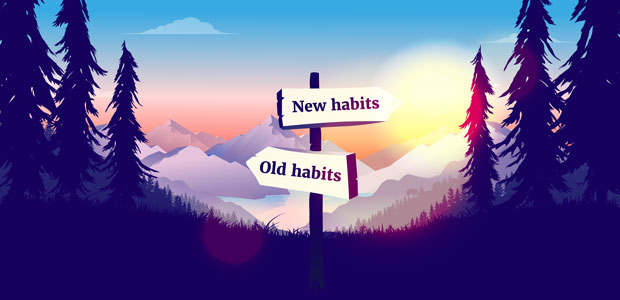
The Habit of Creating New Habits
Our brain is constantly evolving. According to Zimmer, the brain has up to 100 billion neurons which create 100 trillion neural connections, making our brain into a highly complex thinking machine. We can take seemingly random pieces of information and connect them to completely unrelated subjects and create something new, which is why as humans we are incredibly creative and innovative. It seems like a paradox then, as despite this, we can find it so difficult to break negative habits that may even be detrimental to us.
Habits are formed through repeated exposure to a situation or environment which causes us to act, with the resultant behaviour being perceived as beneficial to us. We encode this into our brains through the formation of these neural connections, but these connections do not occur in isolation - they are more like a domino effect. Take for example the act of brushing one’s teeth. As soon as we pick up the toothbrush, our brain will go into autopilot, allowing us to conserve essential brain energy, and execute the habit of dispensing toothpaste onto the toothbrush, brushing our teeth in the order and for the length of time we usually allow, all occurring without the need for any thought. Habits are made up of these individual behaviours that are ‘chunked’ together, so when the brain recognises a cue or trigger, this causes the rest of the dominos to fall in order, or more accurately ‘fire together’, allowing our brain to almost power down, freeing it up to think of more important activities.
These deeply ingrained habits help us through our daily lives. But despite these trillions of neural connections and our brain’s neuroplasticity to constantly rewire itself, we find breaking habits hard to do, sometimes preventing us from embracing change and innovation. MIT research highlighted by Charles Duhigg in his book The Power of Habits, describes the ‘habit loop’, where the brain identifies a cue or trigger to launch a habit, which allows the routine behaviour to automatically kick in, followed by the reward for executing that behaviour. Habits are hard to break, because we are not focusing in on one behaviour but a ‘chunk’ of behaviours that are all related to that habit. So rather than trying to break a habit, made up of lots of individual behaviours, it is better to replace the routine (those behaviours) encoded in an existing habit, with a new routine, maintaining the same reward. This requires us to become mindful of why we carry out the habits in the first place and what we gain or used to gain from them. For example, we might be in the habit of having a coffee at 11am each day, and the cue or trigger maybe that we just want a break from our desks and the coffee becomes an excuse for this. The reward is that we get to socialise with colleagues for the next 20 minutes or so. We may walk away feeling good, only to then be time pressed with all the tasks we need to get done, including spending quality time with our teams. This habit of having a coffee could be replaced with spending 20 minutes of quality time with a team member, making this time an opportunity to check-in with the team. The reward of getting away from the desk and enjoying a coffee is still maintained, but now with a better use of time.
This might all sound easy enough, but habits are formed out of repetition – requiring us to consciously do something different for a period of time until it becomes a habit. The ingraining of new habits requires some effort, and it can be hard to do. How then can we help our employees become more open to new habits?
It is often said that the best time to form new habits is when we have a break from the old ones. When we are on holiday away from work for example, our existing habits have been disrupted, leaving us open to new habits. The CEO of one organisation wanted to develop a more agile mindset and decided that every employee would move desks every 6 months. Whilst this was a source of huge frustration, it did allow employees to become comfortable with the constant change. This kind of disruption could therefore break old, ingrained habits and help employees get into the habit of forming new habits. We can only really change old habits when we are mindful of our current ones. Learning how to change our habits is a skill many people want to develop for every aspect of their lives – both at work and at home. Creating a culture where habits are regularly challenged and developed, provides employees with a growth mindset, constantly looking for improvements and innovation in the way they work, allowing organisations to make the most of the opportunities around them.

